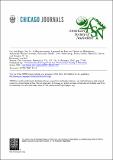| dc.contributor.author | Archetti, Marco | |
| dc.contributor.author | Úbeda, Francisco | |
| dc.contributor.author | Fudenberg, Drew | |
| dc.contributor.author | Green, Jerry R. | |
| dc.contributor.author | Pierce, Naomi Ellen | |
| dc.contributor.author | Yu, Douglas W. | |
| dc.date.accessioned | 2012-11-28T19:58:13Z | |
| dc.date.issued | 2011 | |
| dc.identifier.citation | Archetti, Marco, Francisco Úbeda, Drew Fudenberg, Jerry R. Green, Naomi Ellen Pierce, and Douglas W. Yu. 2011. Let the right one in: A microeconomic approach to partner choice in mutualisms. The American Naturalist 177(1): 75-85. | en_US |
| dc.identifier.issn | 0003-0147 | en_US |
| dc.identifier.issn | 1537-5323 | en_US |
| dc.identifier.uri | http://nrs.harvard.edu/urn-3:HUL.InstRepos:9962009 | |
| dc.description.abstract | One of the main problems impeding the evolution of cooperation is partner choice. When information is asymmetric (the quality of a potential partner is known only to himself), it may seem that partner choice is not possible without signaling. Many mutualisms, however, exist without signaling, and the mechanisms by which hosts might select the right partners are unclear. Here we propose a general mechanism of partner choice, "screening," that is similar to the economic theory of mechanism design. Imposing the appropriate costs and rewards may induce the informed individuals to screen themselves according to their types and therefore allow a noninformed individual to establish associations with the correct partners in the absence of signaling. Several types of biological symbioses are good candidates for screening, including bobtail squid, ant-plants, gut microbiomes, and many animal and plant species that produce reactive oxygen species. We describe a series of diagnostic tests for screening. Screening games can apply to the cases where by-products, partner fidelity feedback, or host sanctions do not apply, therefore explaining the evolution of mutualism in systems where it is impossible for potential symbionts to signal their cooperativeness beforehand and where the host does not punish symbiont misbehavior. | en_US |
| dc.description.sponsorship | Economics | en_US |
| dc.description.sponsorship | Organismic and Evolutionary Biology | en_US |
| dc.language.iso | en_US | en_US |
| dc.publisher | University of Chicago Press | en_US |
| dc.relation.isversionof | doi:10.1086/657622 | en_US |
| dc.relation.hasversion | http://www.ncbi.nlm.nih.gov/pubmed/21091210 | en_US |
| dash.license | LAA | |
| dc.subject | cooperation | en_US |
| dc.subject | symbiosis | en_US |
| dc.subject | microbiome | en_US |
| dc.subject | Vibrio fishceri | en_US |
| dc.subject | virulence | en_US |
| dc.subject | parasitism | en_US |
| dc.title | Let the Right One In: A Microeconomic Approach to Partner Choice in Mutualisms | en_US |
| dc.type | Journal Article | en_US |
| dc.description.version | Version of Record | en_US |
| dc.relation.journal | The American Naturalist | en_US |
| dash.depositing.author | Fudenberg, Drew | |
| dc.date.available | 2012-11-28T19:58:13Z | |
| dc.identifier.doi | 10.1086/657622 | * |
| dash.contributor.affiliated | Archetti, Marco | |
| dash.contributor.affiliated | Green, Jerry | |
| dash.contributor.affiliated | Fudenberg, Drew | |
| dash.contributor.affiliated | Pierce, Naomi | |


